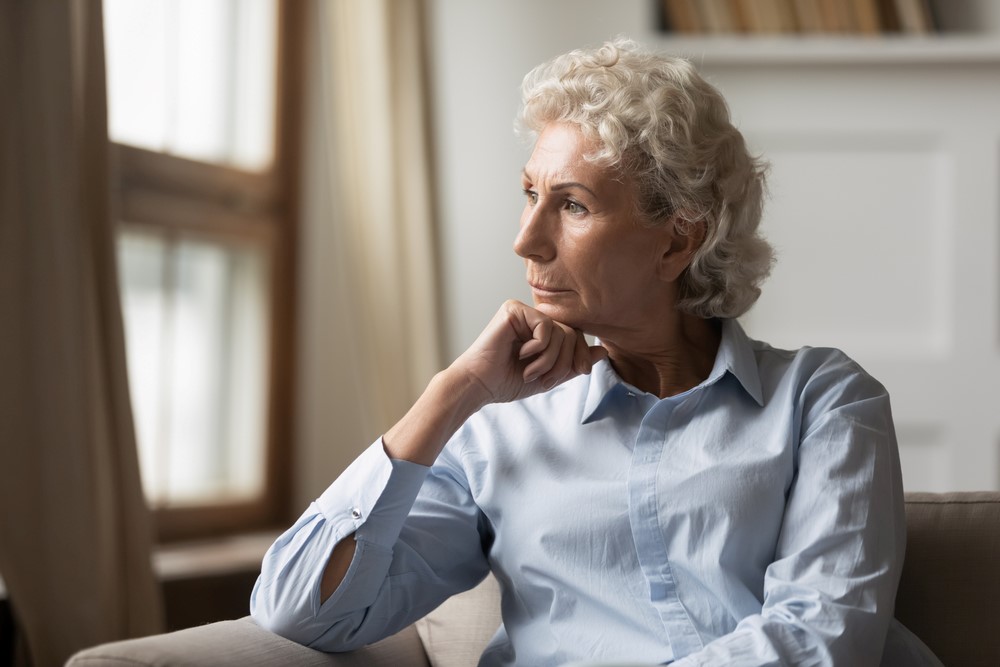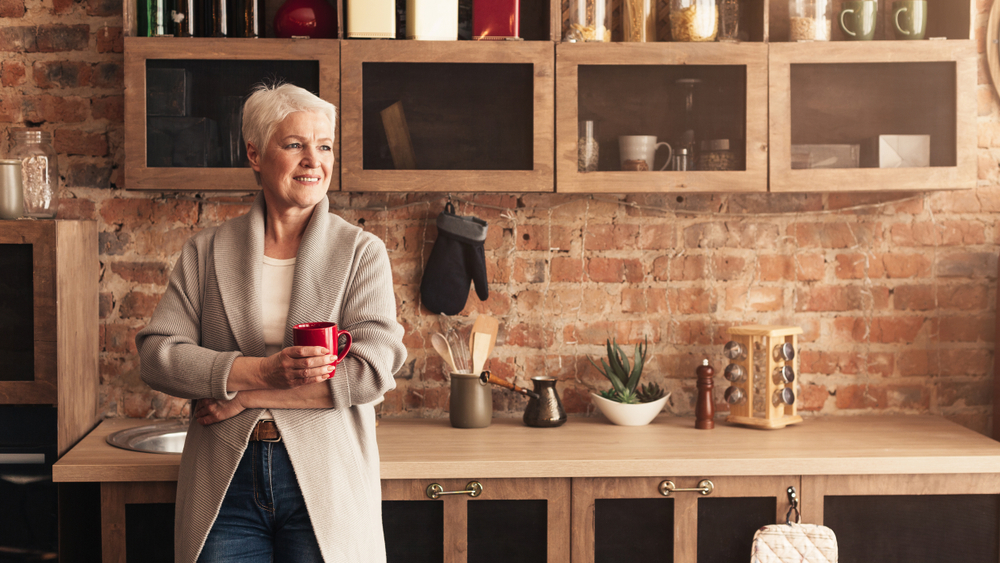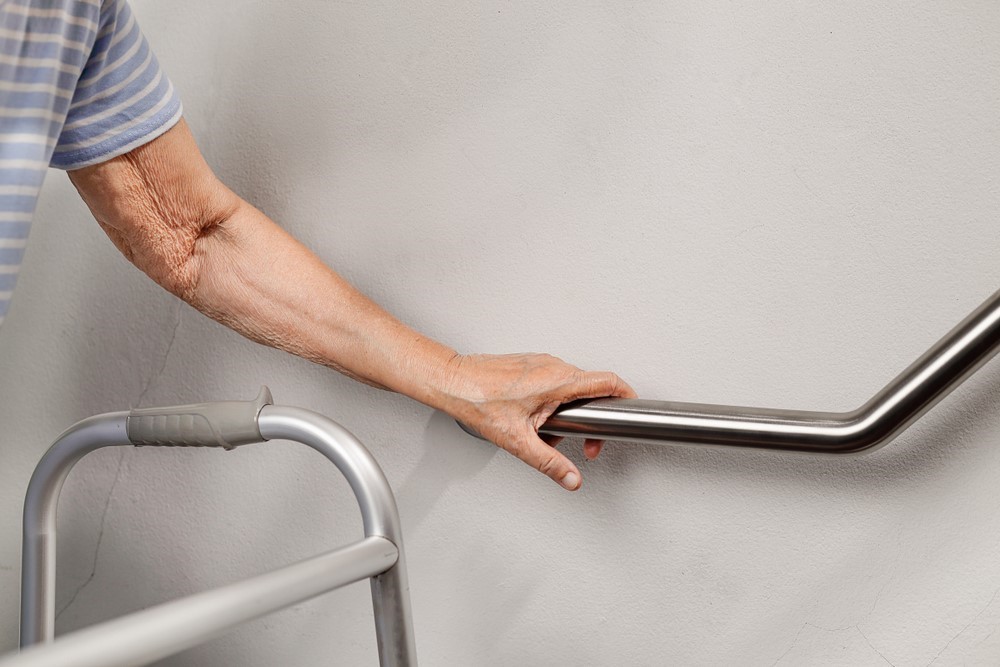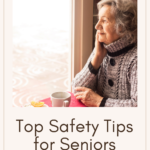
Updated April 30, 2021
Living alone has many advantages, including increased independence. It also gives people the chance to control their own environments and make their own decisions. Yet, living alone also comes with risks, which is why we need to talk about safety tips for seniors living alone.
The practice is also becoming increasingly common. 27% of older adults in the United States live alone, more than in most other countries.
There are many reasons for living alone. Some people do so by choice. For others, it is simply the most practical approach. Living by yourself can also be much less scary than assisted living.
But, a key part of living alone is being safe. There are many additional risks, including some that aren’t obvious. So, in this post, we’re looking at ways seniors can be on their own and still stay safe. Some of these tips are specific to seniors, others apply to any age group.
Safety Tips for Seniors Living Alone

Take Care of Your Physical Health
Being in good health is so critical. It can be the difference between being independent and having to get support. Your health also influences how easy life is on a day-to-day basis, along with what tasks you can do.
Similarly, a healthy person may be able to recover from a fall or an injury with relative ease. The same isn’t true for someone with multiple health challenges.
Many aspects of health can’t be controlled, of course. But, your diet and lifestyle do play a huge role in influencing your health. Key factors include:
1. Eat healthy food regularly
A good diet is critical to long-term health. This includes having an emphasis on fruit and vegetables, along with whole grains. It’s also important to avoid processed foods as much as possible, particularly those that are high in sugar.
The ideal solution is to prepare meals at home. If you need inspiration or guidance, there are various cooking classes for seniors that are worth trying. They’re not just for beginners either. This type of class can help you simply improve your skills. They can be fun too.
If you don’t think that you can cook every meal, there are also home food delivery services and related alternatives.
2. Stay active
Exercise is another important aspect of being healthy. Not only can it keep your weight in check, but it also helps to improve flexibility, reduce disease risk and help prevent falls.
Many seniors struggle with this goal, especially as chronic illness can make some types of exercise difficult (or even impossible). Thankfully, there are many different options, ranging from the simple to the complex.
The articles listed below all offer extra details about exercise approaches you can consider.
- Benefits of Chair Yoga for Seniors
- A Simple Exercise Solution for Seniors and Caregivers
- Have Painful Knees, But Still Love to Exercise?
- Low Cost Ways for Caregivers and Seniors to Exercise at Home
- How to Safely Exercise at Any Age
- Seated Exercises for Seniors: What to Look For
3. Manage medications well
Poor medication management often sends people to the hospital. This can be a challenging area, as you might be on multiple medications. In some cases, they may have different requirements, like when you need to take them and whether they’re taken with food or not.
And honestly, it’s tough to always remember whether you’ve taken your medication each day, especially if you have many different medications.
Thankfully, there are various medication management systems and apps that can help you to stay on top of your medications. You can also develop your own approaches, like using a checklist or a calendar to mark off when you have taken medication.
Take Care of Your Mental Health
As a society, we tend to favor physical health over mental health. But, mental health is extremely important.
1. Get involved socially
Isolation is a huge risk for seniors, particularly those that are living alone. Many find that they have few contacts in their local area. Family connections may be limited too.
Thankfully, there are many activities that you can get involved in. It’s mostly a matter of making a concerted effort to do so. For example, local senior centers will often host events and there may be weekly clubs in your area. Focus on things that you might enjoy. This also helps you to find other people with similar interests to you.
2. Seek help before you need it
There is still a huge stigma surrounding mental health – and the topic isn’t talked about as often as it should be. But, if you’re at all concerned, seek help earlier rather than later.
This might be as simple as reaching out for more social contacts or getting involved in life a bit more. Alternatively, you might need to talk to your doctor about medication or therapy, especially if you are struggling.
Many people choose not to seek help, as they feel that they are fine without it. The problem is that mental health crises are often sudden and severe. It’s always best to prevent these from happening, rather than try to deal with the aftermath.
Take Care of Your Environment

While the other safety tips for seniors living alone were important, optimizing your living environment is probably the most crucial area. Even small changes can make a dramatic difference. Some of these tips help reduce the risk of accidents, while others help make sure you are okay if anything does go wrong.
1. Have a lockbox
A lockbox is a way to store a spare key outside of your house. These use a combination lock, which you can give to people that you trust.
This is an effective way of keeping your home secure while making sure people can quickly gain access when necessary. The box also saves you money, as it reduces the likelihood that someone will need to break a lock or a window to access your home during an emergency.
This product is a fantastic example, as it is inexpensive and easy-to-use.
Many alert systems also work with lockboxes. For example, LifeStation Medical Alert will provide the box and gives emergency responders the appropriate code if there is an emergency.
2. Meet and interact with your neighbors
Social contact is important anyway, but neighbors play a particularly crucial role. Love them or hate them, your neighbors are often the first people who will know if something goes wrong.
Even if you don’t want to be close friends with your neighbors, taking the time to get to know them a little really is important in the long-term.
3. Have an alert system in place
Alert systems are often associated with people already struggling, but they’re useful for anyone who is healthy as well. These systems give you the ability to easily contact someone, regardless of what happens and where you are. Medical Care Alert and MobileHelp are both systems that work well.
4. Have a system for checking in
Set it up so that you check in with people at regular intervals. Perhaps they call you or maybe you call them. It doesn’t have to be a long conversation, just a minute or two. But, it is a way of making sure that if anything happens, people know about it.
Some people suggest daily check-ins, others suggest doing so weekly. The best answer will depend on your health and situation. For example, if you are independent and healthy, daily check-ins may seem extreme. But, they can be necessary for people with significant health challenges.
One easy way is to find someone in similar situation to you. That way you are basically checking in on each other. For many people, that approach is more appealing, as no one is going out of their way.
5. Keep lists of personal information and medications handy
The best place to do this is in your wallet, although your purse will also suffice (if you regularly switch purses, it may be easier to have multiple copies). The information is critical in any medical crisis, especially if you can’t communicate.
6. Keep those lists updated
Your medication may change often and keeping an updated physical list may feel frustrating. Some people rely on apps or other digital tools, which can be updated much more easily.
Digital versions can be useful, especially if someone asks you what medication you’re taking. But, they don’t have the same power. Emergency responders won’t know to look for the information digitally. If you keep your phone locked, they may not have access to it anyway.
7. Remove trip and fall hazards
We’re focusing on safety tips for seniors living alone, so we can’t forget about trip hazards. After all, even a single fall can have long-term negative impacts for seniors. Things like rugs, electrical cords, poor lighting and low furniture can all increase the risk of falls. This is especially true at night, where it can be hard to see your way and you often aren’t fully alert.
Watch out for slippery environments as well. For example, you may want safety bars in your bathroom and non-slip mats on the shower floor. Also make sure that the entry points to your home don’t become slippery, even if people have wet shoes.
Even if the risk of a fall seems low, it’s much better to remove the hazard. Minor and major falls can have significant long-term implications for health hand it’s simply not worth the risk.
8. Make sensible decisions
One final safety tip is to just be wise. This means that if something is obviously risky, don’t do it, even if the risk is low.
For example, try to avoid loose clothing while cooking. Cooking accidents are surprisingly common and loose clothing increases the risk of this happening. Similarly, you want to check your smoke alarm batteries regularly.
You should also talk to your doctor about any physical symptoms or changes that you experience.
Most of the decisions you should make for your safety truly are logical. The challenge is simply making them. People often hesitate in some areas, as focusing on safety too much can be unappealing and may make you feel like you’re truly getting old.
But, the emphasis on safety is critical. This can be the difference between staying healthy and living at home, versus requiring additional support or being no longer able to remain at home.
Finally, there are many products and tools that you can turn to that can help make the home safer. For example, some can make exercise easier and less stressful, especially if you have limited mobility. Others can help improve daily living, making tasks less challenging and more enjoyable.
Feeling Overwhelmed?
Check out our Caregiving Consulting service for personalized support and guidance.


I liked how you mentioned that you should get rid of things that are fall hazards for a senior. My mother is getting older and I want to make sure she is safe in her elderly age. I’ll be sure to talk to her about getting rid of things that she could easily fall over.
Yes, trip hazards are easy to ignore, especially for seniors who have been independent for most of their lives. However, anything that helps to avoid a fall is worth the effort, as falls can have a huge impact on a senior’s ability to be independent. Even a single fall can have a surprisingly strong long-term impact.